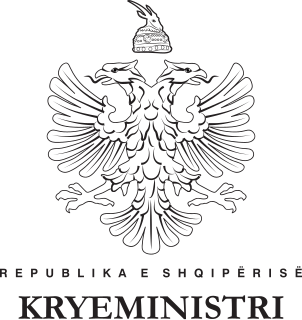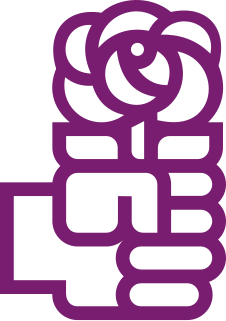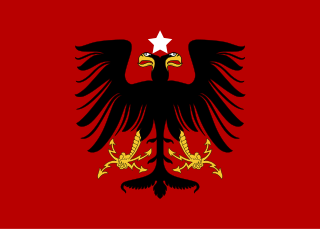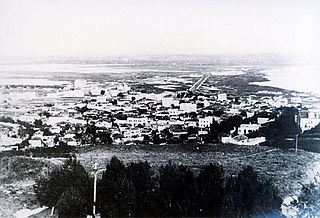This article needs additional citations for verification .(November 2018) (Learn how and when to remove this template message) |
| Ministry for Europe and Foreign Affairs of Albania Ministria për Evropën dhe Punët e Jashtme | |
|---|---|
| Seat | Foreign Affairs Office |
| Appointer | Prime Minister |
| Term length | Four years |
| Inaugural holder | Ismail Qemali |
| Formation | 4 December 1912 |
| Website | punetejashtme.gov.al |
The Minister for Europe and Foreign Affairs of Albania (Albanian : Ministër për Evropën dhe Punët e Jashtme), officially styled the Minister for Europe and Foreign Affairs of the Republic of Albania (Albanian : Ministri i Evropës dhe Punëve të Jashtme të Republikes të Shqipërisë), is the Foreign Minister of Albania, responsible for the foreign relations of the country, as well as the integration to the European Union. [1] The ministry merged with the Ministry of European Integration during second Rama government. The Foreign Minister is one of the most important members of the Cabinet of Albania.

Albanian is an Indo-European language spoken by the Albanians in the Balkans and the Albanian diaspora in the Americas, Europe and Oceania. It comprises an independent branch within the Indo-European languages and is not closely related to any other language in Europe.
A style of office, honorific or manner/form of address, is an official or legally recognized form of address, and may often be used in conjunction with a title. A style, by tradition or law, precedes a reference to a person who holds a post or political office, and is sometimes used to refer to the office itself. An honorific can also be awarded to an individual in a personal capacity. Such styles are particularly associated with monarchies, where they may be used by a wife of an office holder or of a prince of the blood, for the duration of their marriage. They are also almost universally used for presidents in republics and in many countries for members of legislative bodies, higher-ranking judges and senior constitutional office holders. Leading religious figures also have styles.
The foreign relations of Albania are its relations with other governments and peoples. Foreign relations are conducted through the Ministry of Foreign Affairs in Tirana. The current minister is de jure Prime Minister Edi Rama thanks to president Ilir Meta not accepting the role to be held by the de facto minister, Gent Cakaj, due to a lack of experience from the latter. Albania is a sovereign country in Southern Europe, and the Mediterranean that declared its independence on 28 November 1912. Its foreign policy, has maintained a policy of complementarism by trying to have friendly relations with all countries. Since the collapse of Communism in 1990, Albania has extended its responsibilities and position in European and international affairs, supporting and establishing friendly relations with other nations around the world.
Contents
The Foreign Minister coordinates the foreign policy of Albania and maintains relations with other states and international organizations. He also cooperates with Albanians living in the diaspora and supports Albanian cultural and educational institutions abroad its borders. Regular parliamentary elections are held every four years. Afterwads, the elected Prime Minister of Albania selects members of the Cabinet of Albania, and allocates posts to members within the cabinet. Before beginning duties, the Ministers swear before the President of Albania. [2]

The Albanians are an ethnic group native to the Balkan Peninsula and are identified by a common Albanian ancestry, culture, history and language. They primarily live in Albania, Kosovo, North Macedonia, Montenegro, Serbia as well as in Croatia, Greece and Italy. They also constitute a diaspora with several communities established in the Americas, Europe and Oceania.
The Albanian diaspora are the ethnic Albanians and their descendants living outside of Albania, Kosovo, Southeast Montenegro, West North Macedonia, Southeast Serbia and Northwest Greece.

The Prime Minister of Albania, officially styled the Prime Minister of the Republic of Albania, is the head of government of the Republic of Albania and as well the most powerful and influential person in Albanian politics. The Prime Minister holds the executive power of the nation and represents the Council of Ministers and chairs its meetings.
The 52nd and current officeholder is Ditmir Bushati of the Socialist Party who was elected on 23 June 2013 and started his first four-year-term on 15 September 2013. [3]

Ditmir Bushati is an Albanian politician and diplomat who served as Minister of Foreign Affairs from 2013 to 2019. He previously chaired the Parliamentary Committee for European Integration.

The Socialist Party of Albania, is a social-democratic political party in Albania; it gained power following the 2013 parliamentary election. The party seated 66 MPs in the 2009 Albanian parliament. It achieved power in 1997 following a political crisis and governmental realignment. At the 2001 parliamentary election the party secured 73 seats, which enabled it to form a government. At the general election of 3 July 2005, the Socialist Party lost its majority and the Democratic Party of Albania (PD) formed the new government, having secured, with its allies, a majority of 81 seats.














